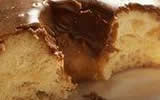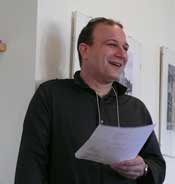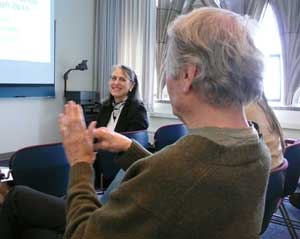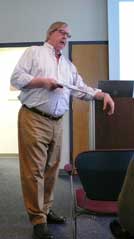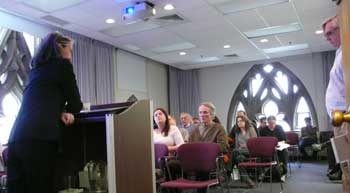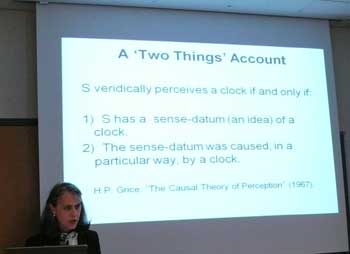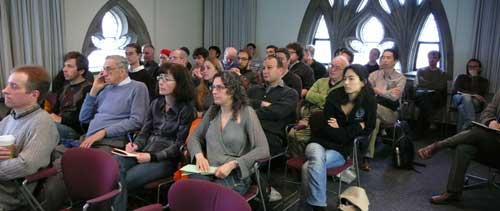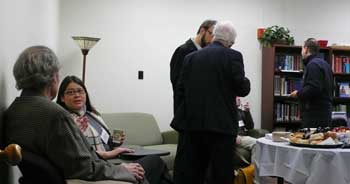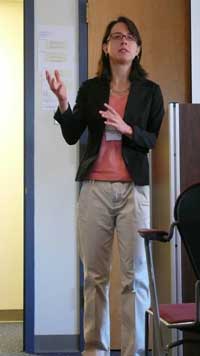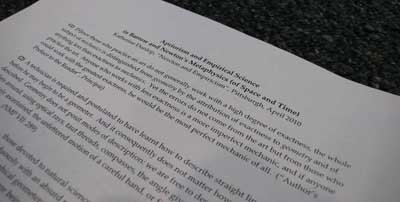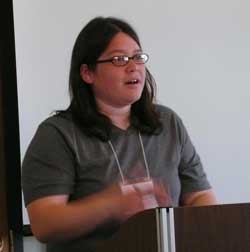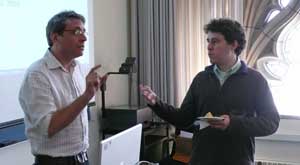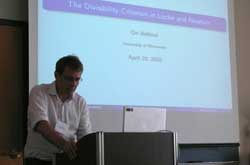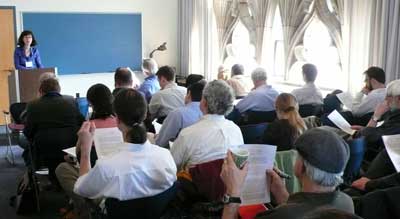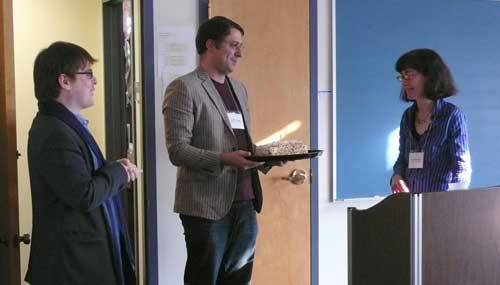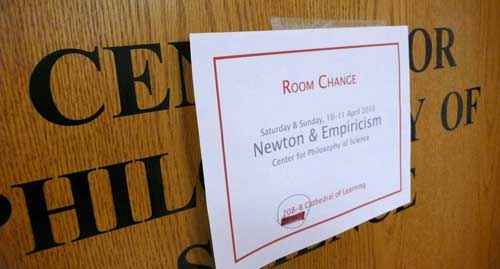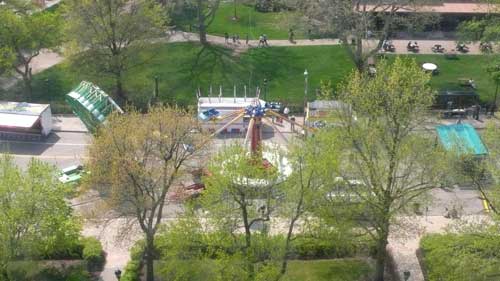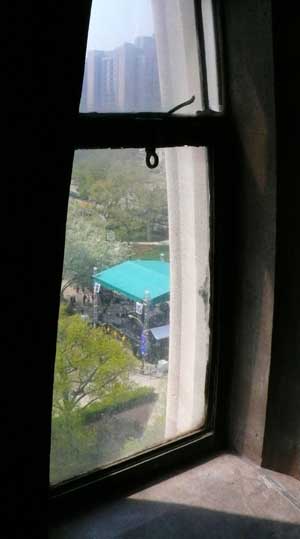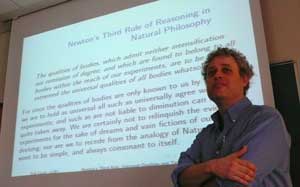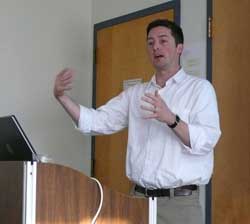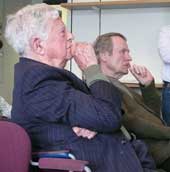::: center home >> being here >> last donut? >> getting somewhat real |
Show or Tell in the Land of Descartes and Newton ::: The Paradoxes of Perception: Cartesian Sources-- and Solutions ::: Newton and Empiricism It is hard for my head to keep up with the pace of ideas at the Center. On Wednesday afternoon, we settled into our reading group to talk about a draft by one of our Visiting Fellows, Tad Szubka. It was a careful piece of Quine exegesis, teasing out overlooked pragmatist influences that permeated Quine's thought. It is now Friday afternoon and I am sitting in my office buried in computations in quantum theory. They are simple computations but plagued with a combinatorial explosion. As I multiply out expressions, the terms grow exponentially in number and I am fully immersed trying to channel the energy of this explosion to useful ends. Then the Newton scholars start to arrive. The weekend that is rapidly approaching will hold our " Newton and Empiricism" conference. The idea for the conference started several years ago when Eric Schliesser and I found ourselves in a bar in Ghent on one evening of a conference. Would such a conference interest the Center, he asked. The event grew from that seed. Zvi Biener joined the organizing committee and then the event was delayed a little to be sure that our local Newton expert, Ted McGuire, would participate. I had initially expected the event to be appealing only to the narrowest of specialists--those who spend a life dissecting Newtonianism in the Enlightenment. But the list of participants grew well beyond those expectations. Now they were arriving. Some were old friends; and others were more recent friends; and still others were making their first visit to the Center. Eric Schliesser himself confided that this was the first time he'd been in the Cathedral of Learning. That was a satisfying moment for me. I am eager to open the Center to everyone, so first time visitors are very welcome. As the group collected, I struggled to drag my head away from the quantum theory into a different sort of thought. This weekend, I expected, would stretch me. These are Newton and Enlightenment scholars steeped in thoughts and texts that I know at best fleetingly. For me, the exercise would be to observe and try to understand, as much as I could. It would be a visit to another land with its own culture. I did not expect to be able to absorb everything. My plan is to skip in and out, catching a talk here or there, so that my report will be much less than complete. ---oOo--- It is Friday and the conference does not begin until Saturday. So why are we all congregating? As it happens, this Friday afternoon, Catherine Wilson is scheduled to speak in our Annual Lecture Series. She is an accomplished Descartes scholar and, from our, 21st century perspective, the temporal distance between Descartes and Newton is slight. So in the puzzle solving that yields our calendar, the two events ended up adjacent. Peter Machamer is an old friend of Catherine's and himself a Descartes scholar. So he officiated; and did so in just the manner you would expect. Catherine's talk is on theories of perception in Descartes. She is critical of the "two thing" theory that treats perception in terms of two things: some portion of the world and something inside our head that pictures it. The biggest trouble is that there are many different heads. She means not just people heads but animal heads as well; and they all likely have different pictures. There must be mismatches between these many pictures and the world. Instead, following Cartesian ways, she will advocate a "one thing" theory. The one thing is the world. Perception is simply what happens when that world interacts with a normally functioning cognitive system, unhampered by perceptual "derangers." From my distant vantage point, I was unable to assess either the Cartesian scholarship or its contribution to theories of perception. What I found striking was the conception of the project. It was, in the end, to describe and endorse a particular theory of perception. Yet it was also Descartes scholarship. We were taken into Descartes' Meditations and they provided the launching point for the theory. This reveals a particular appraisal of philosophy. The field is dominated by the ideas and works of a few very great thinkers. One ventures new proposals by first seeking authority in those ideas and inspiration in their words, even if this takes us to a starting point that may be nearly 400 years past. This may seem slighting to the scholars of the last generation; but, in this tradition, that generation delivered the same slight by also taking their inspirations from much earlier writers. The second aspect that was striking was that the talk was read. (Catherine did project powerpoint images, but they soon lost their synchrony with the text read.) Again this mode of delivery is common in philosophy. Giving a talk is really a literary event. One reads a carefully crafted text with sentences finely balanced to express the speaker's point precisely. Nothing more; nothing less. The culture in philosophy of science long ago migrated from this humanist standard to the scientists' standard. They project their powerpoints and speak to them, pretty much off the cuff. Chatter has replace oratory. Nonetheless, this migration has been a relief to me. In the end, I just cannot follow most talks as they are read. I suppose I just don't have a literary mind. The sentences, delivered in a monotone, leave me scrambling even to discern the major claims of the paper. And I struggle to hold in memory sentences three times the length of those we'd speak comfortably. That we have text and not speech enables clever internal contradictions to be sprinkled through the text. We hear that Descartes endorsed two theses:
That is a delightful paradox for me to encounter in a text. I can pause and savor it, and then dissolve it. In a text read aloud, it passes in three breaths and leaves me perturbed. The paradox succeeded and I just couldn't resist asking Catherine afterwards for the answer, as we stood around wine and cheese. She glanced at me with look that seemed to say, "do you really want me to spoil it for you?" Perceptions, she explained, are false literally, but veridical pragmatically. --oOo-- I now had my system to guide me through the remaining days of my visit to the land of Descartes and Newton. Would speakers give me an exegesis of their target's text as an end in itself, or as a launching pad for a new theory? Would it be "show" or "tell"? The following morning we assembled for the Newton event proper. I was delighted to see that Ernan McMullin, our &HPS sage had decided to come. The breakfast was at 8:30am and the first talk at 9am. As promised, Peter Machamer was not there yet. After Zvi Biener's introductory announcements, the first talk was Katherine Dunlop's. In my system, she chose "tell" over "show" and her goal was purely exegetical. In keeping with the literary "tell" tradition, she circulated a handout that listed the passages of text from Newton and Barrow that were central to her argument. It provided no text from her hand. Her goal was to understand what later thinkers may judge a lacuna in Newton's celebrated thinking on space and time. He had labored greatly on the problem of judging the equality of time intervals. Yet he passed over the analogous problem for space. He simply assumed that moving rods around in space gives an unproblematic standard of equality of length. That matters might not be so simple emerged two hundred years later. Helmholtz and Poincaré urged that sufficiently systematic disturbances to the lengths of rods as they are transported might lead them to conform to a completely different geometry. Katherine dipped into Newton's predecessor, Barrow, to understand why Newton may have overlooked this possibility. The next speaker was Mary Domski. In my system, her goal was exegesis and her method was "tell." I stood next to her at the podium just before her talk. She would read it, she confided in me apologetically, and it was Zvi's fault. Zvi, standing just a few feet away, drifted towards us. She had planned to speak to powerpoints, but then Zvi told her who else would be at the conference… We laughed nervously. Mary's exegetical point concerned Newton's method. In brief, was he the clever empiricist of Howard Stein, assembling the clues in our experience to yield the truths of Nature? Or was he the theological thinker of Andrew Janiak, who found at least some of those truths through divine metaphysics? Mary inclined towards the empiricist Newton, but in an early Newton manuscript she had found an approach that is neither. The morning had been a vigorous one. Our conference room was nearly full and the half hour given to each talk for questions was too small to hold the flood of interest each talk generated. Shortly before noon, the room released its prisoners. They could enjoy a few moments of sunshine while they sought out lunch in the back alleys of Oakland. ---oOo--- Through the afternoon, I managed to dip in and out of the conference room. I've always found Newton an especially engaging figure and can generally hold my own on Newton in casual discussion. That is not so in this group. They command Newton's writings, I'm willing to guess, more thoroughly than Newton himself. The speakers can select and compare fragments of Newton's writing and those of other figures of the time with the facility of great biblical scholars. The first introduction of the afternoon from Eric Schliesser was gratifying. In setting up the conference, I had urged him to seek out new scholars. There was no need to have an event in which the same old scholars display the same old ideas and get asked the same old questions. Eric now introduced Matthew Priselac, a graduate student at Chapel Hill. Matthew began his talk on Newton's notion of substance. He stood and spoke, in the "show" tradition, but what he was showing were only quotes on the handout. At first I thought this was a warm up before he would bury his head in the reading of a "tell." As time passed, it was clear he would continue in this conversational mode. The new generation, even a graduate student presenting before a truly scarily smart and knowledgeable audience, was moving to a mode that I could follow. Ori Belkind spoke next. His digital display was unmistakable. It was generated by a LaTeX template. This is the techie's heaven, yet then he reverted to "tell" and proceeded to read his manuscript. It was an interesting hybrid. Then came Lisa Downing, the invited speaker. She was introduced by Zvi who recalled the process that led her name to be proposed. "Fifteen seconds," he asserted, "that's all it took! We all had the same thought!" Her talk was on Locke's metaphysics and Newtonian metaphysics. I could not linger long enough to know if Newtonian metaphysics differed from Newton's, but in this group, it may well. She read her paper--"tell"--and circulated a handout with essential quotes. It was, Zvi had discerned, Lisa's birthday today. So he contrived that one of Prandtl's Bakery's famous burnt almond cakes would materialize in the Center. At the appointed moment, when Lisa's session had drawn to a close, Zvi opened the door and in walked Dennis Pozega, carrying the cake with its candle lit. ---oOo--- I was not able to get back to the conference until Sunday afternoon. As my bus pulled up, it was clear that the disaster we had anticipated earlier had indeed come to pass. There on Bigelow Boulevard, right under our conference room window, a huge sound stage had been set up. It is the Bigelow Bash 2.0 that had been underway through the weekend. I asked a security guard when the music would start. "2pm," he said. It was earlier than that, but moments later the band started. Standing near the enormous speakers, I could feel the air vibrate against my skin. We were prepared and, as I arrived at the Center, I saw that the move to a quieter room had already taken place. It was for the better. We had a perfect view of the Bash from our conference room window. That meant the sound stage was right outside. The music, now blaring through the window, was grating. Did they realize that powerful amplification does not transform tuneless shouting into music? Did I really think that? Perhaps my inner curmudgeon is showing and I needed a little correction. Bryan Roberts, an accomplished musician, happened to be in the Center. I asked him. He looked skeptically at me and walked into my office, which also overlooks the sound stage, to wait for the sound to restart. The band struck up again. "That's horrible" he blurted out. All this was so perfectly worked out, I thought. What could go wrong? Then the door to the Center opened and in walked the conference. It turned out that our back up room was pretty much as noisy. Bad music, like bad news, travels. But the room was much further away from the coffee urn in the Center. "There was a spontaneous vote," Zvi told me, "It was a revolt." We spent the last two talks of the conference listening to the speakers, trying to block out the horrible music. That proved easier than I thought. It was uniformly horrible and there's something about uniformity that makes it recede. ---oOo--- I was beginning to think that my system was only partially successful. The "show or tell" question divided the speakers. However, after Catherine Wilson's talk, I'd heard no talk that used the history to launch a new theory. That changed with Erik Curiel's talk. It was a pace and wave and "show" talk; and it used Newton's thought to carry us to these about contemporary science. His concern was Newton's third law of reasoning. That law gave the conditions under which we are licensed to extend an experimentally determined property from the cases we find to all cases--or, to use Newton's word, to "esteem" them universal. It is what would put the "universal" in Newton's universal gravitation. This famous rule, that had appeared repeatedly in other talks, was the starting point of a long journey that took us to contemporary science, the frameworks of theories, spaces of states, trajectories through them and things kinematical and dynamical. Our destination is the way we now carve up the world into its basic components. That, Erik assured us, is how Newton actually applied his rule, even if he did not quite understand it that way. Chris Smeenk's was the last talk. His position was unenviable. Quite a few of the participants had already taken their leave; and conference fatigue was clearly setting in. I assured Chris that the organizer's strategy had been to keep a strong talk for last: the "bookend" strategy. He admitted that he could tolerate a little less flattery. Chris lived up to expectations. Indeed from my perspective his was the best talk that drew on the most interesting parts of Newton's work: his extraordinary use of evidence and his penetrating theoretical constructions. Chris recalled work that he'd done in collaboration with George Smith and ideas that he shared with his colleague at Western Ontario, Bill Harper. In Newton, he reported, there is a particular sort of empiricism. Newton did not draw on experience as an independent source of well-formed knowledge for his theorizing. Rather, the connection of theory and experiment was more intimate. Newton undertook "theory mediated measurements." These were illustrated effectively with Newton's famous precession theorem and the measurement of the strength of gravity with pendula. And my system? The talk was definitely a "show" that was well rehearsed and illustrated with carefully crafted, LaTeX driven slides. But was the quantitative empiricism merely a commentary on Newton's method or advocating something with wider horizons? I had other questions for Chris and, by the time I realized I'd not asked this one, he had set off on his drive home. John D. Norton |

